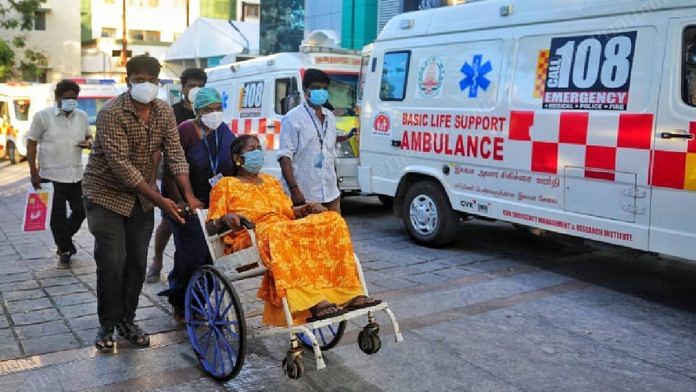New Delhi: The rise in Covid-19 cases across the country has brought with it, among other issues, a higher incidence of strokes, according to several neurologists.
Strokes have long been associated with the SARS-CoV-2 virus, which causes inflammation in the body and coagulation of blood, increasing the chances for vulnerable populations to develop a stroke. The rise in stroke cases among Covid-19 patients is most likely a result of the large number of infections being recorded in the second wave compared to the last, doctors told ThePrint.
However, a newer development in this year’s wave is the occurrence of strokes after Covid recovery or after patients have been discharged from the hospital.
“What we’re seeing more frequently now is patients coming back with strokes after they have been discharged or have recovered,” said Dr Anshu Rohatgi, a neurologist with Sir Gangaram Hospital in Delhi, adding, “What this indicates is there is still inflammation in the body which has to be closely monitored.”
In a tweet posted last week, Dr Ambrish Satwick, a vascular surgeon at the same hospital, had thrown light on the issue with a photo of what a blood clot looks like.
What Covid clots look like. Covid produces blood clots. The incidence of heart attack, stroke, or limb loss due to an arterial clot in Covid varies from 2%-5%. We pried these out of the lower limb arteries of a Covid patient. We were able to save the limb. pic.twitter.com/TrKhVJmFdF
— Ambarish Satwik (@AmbarishSatwik) May 5, 2021
At a press briefing last week, Niti Aayog member (health) Dr V.K. Paul had said: “Secondary infections, thrombosis/stroke and adverse effect on lungs are all matters of concern post-COVID … Sometimes the residual effect stays for a long time and can be harmful.”
Also read: ‘No bed, no ICU, everything was full’: Hospital trauma returns to Maharashtra as cases climb
Strokes in Covid-19 patients
A study of over 20,000 patients from the American Heart Association’s COVID-19 Registry found that the incidence of strokes was higher among Covid-19 patients compared to patients who had influenza or sepsis.
Large scale studies have pegged the incidence of strokes among Covid-19 patients to be between 0.5 per cent (The Lancet) and 1.4 per cent (AHA Registry).
The Lancet study, which was published in August 2020, said: “The results of regression models suggest that the need for mechanical ventilation and a history of ischaemic heart disease are the independent predictors of stroke among SARS-CoV-2 hospitalized patients.”
The AHA study noted that ischemic strokes were more common, presenting in 52.7 per cent of cases. Ischemic strokes occur when an artery that supplies blood to the brain is blocked by a blood clot.
Even though the exact mechanism through which Covid-19 causes strokes is unknown, it is thought that the virus triggers an immune response that activates coagulation. A paper in the BMJ medical journal describes it as “an interplay between activation of intravascular TF (Tissue Factor), innate immune cells, platelets, endothelial cells, and releases neutrophil extracellular traps (NETs) which can activate the contact pathway of coagulation.”
Doctors treating Covid-19 say that in the second wave, several patients have been presenting stroke symptoms soon after being discharged from the hospital, indicating that the inflammation caused by the illness could last weeks in moderate to severe patients.
Speaking to ThePrint, Dr Praveen Gupta, director and head, neurology, Fortis Memorial Research Institute, Gurugram, said, “Last year we saw a lot of stroke cases during Covid care, but now we are seeing them come back in the first few weeks after recovery. Moderate and severe patients are most affected.”
At Gangaram hospital, Rohatgi said they had noted a similar trend. “It is a matter of concern that patients are coming back post recovery, and we are trying to record these cases for further study. Even though this is happening with moderate and severe cases, younger people under the age of 50 are also susceptible.”
Also read: Most countries used ‘Swiss cheese’ model to reduce Covid. In India, the holes were too big
Blood thinners could help in post recovery
In moderate and severe patients, Covid-19 causes two inflammatory markers to rise — the D-Dimer and C-reactive protein (CRP). That patients are presenting stroke symptoms post recovery indicates the inflammation in the body can remain.
“This has brought to focus the role of blood thinners, particularly for high-risk patients recovering from Covid-19,” Dr Deepak Gupta, a neurosurgeon practicing with the All India Institute of Medical Sciences (AIIMS), told ThePrint.
“Last year, we avoided prescribing blood thinners because it was thought they could lead to bleeding disorders, but it’s becoming clear that blood thinners can help manage and avoid strokes.”
Doctors said blood thinners and anticoagulants should be prescribed for moderate and severe patients recovering from Covid for 3-12 weeks after recovery, depending on their case history.
“There has to be an awareness of the importance of monitoring the inflammatory markers post-Covid. These should continue to be checked even after recovery, so a stroke can be avoided,” said Dr Gupta.
(Edited by Manasa Mohan)
Also read: India could see 1 million deaths due to Covid by August, Lancet says



